FTP
- Create a SFTP connection with FileZilla client
- Using FTP with WinSCP
- Using FTP with Total Commander
- How to setup FileZilla FTP client
- DotRoll free hosting
- Illegal PORT command
- FTPS
- FTP
- Creating and editing a file via FTP
Create a SFTP connection with FileZilla client
On cPaneles servers, it is only possible to establish an SFTP connection with the FTP user associated with the hosting ID.
GENERATE SSH KEY, OR SET IT UP
REMOVE A PASSWORD FROM THE PRIVATE KEY AND SET THE KEY IN FILEZILLA
Start FileZilla.
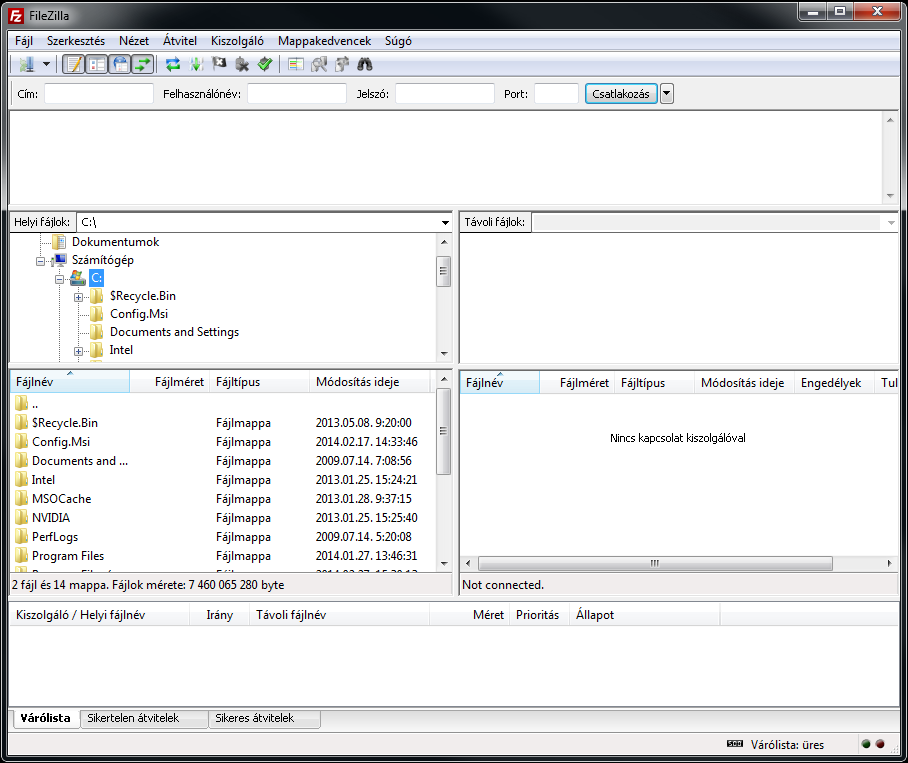
FileZilla main window
In the next step, click Edit / Preferences… in the top menu bar.
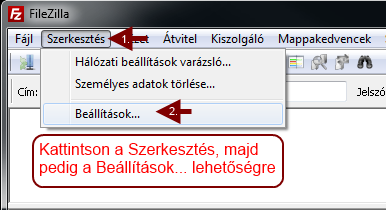
FileZilla Edit/Settings menu
In the popup window, click SFTP in the list on the left, then click Add Key File… button.
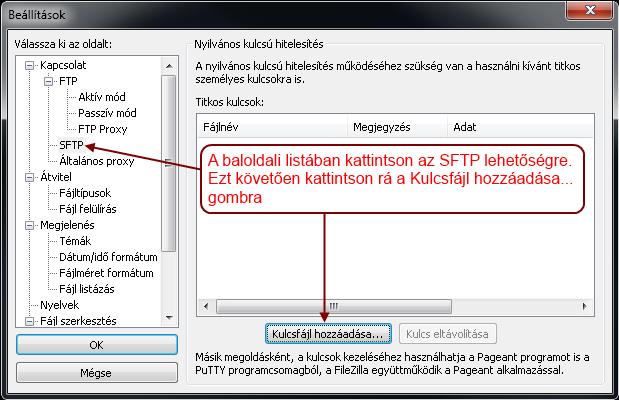
FileZilla Settings menu
Browse to the created private key file and confirm the warning with OK button.
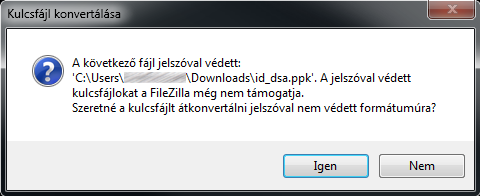
Converting key
Enter the password that you entered when creating the key, and then click OK button.

Type password
The private key will then appear in the Secret Keys list. Click Ok to close the window.
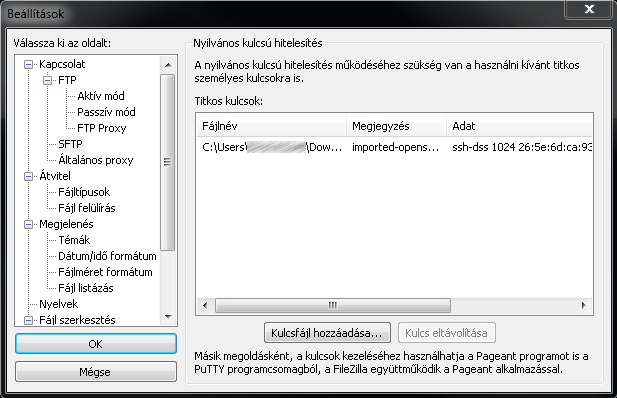
Added key
CREATING THE CONNECTION
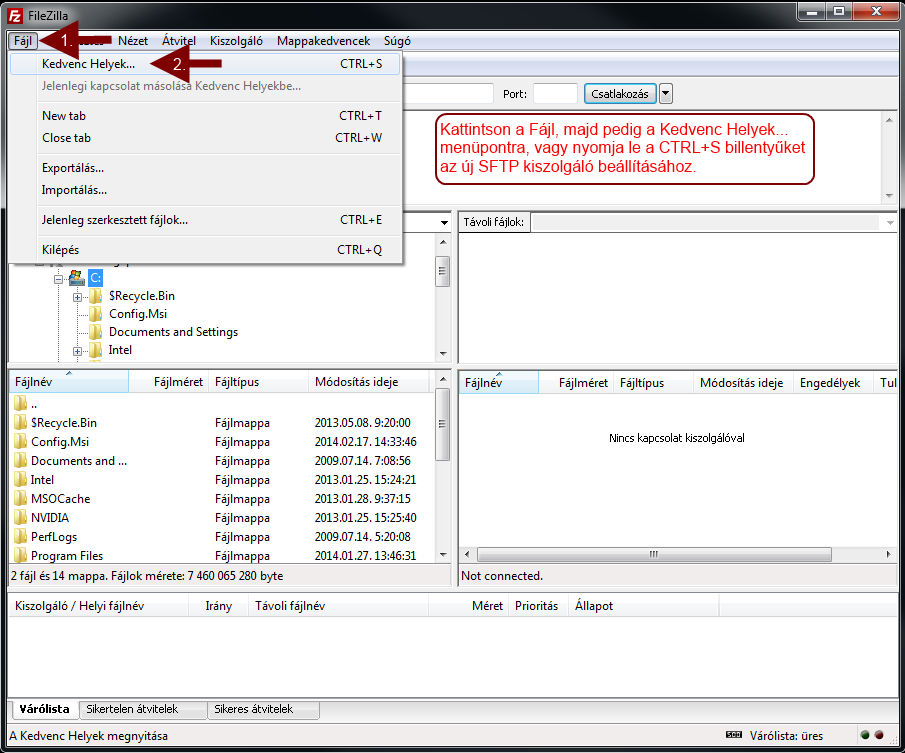
Connecting
In the popup window, click the New Station button.
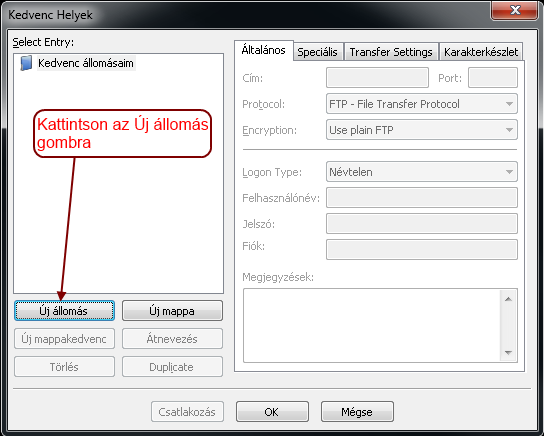
Create new connection
Then name the conection and enter the following information:
- Address: hostingID.loginssl.com
- Port: Here you need to enter the port number of the SFTP protocol, which is shown in Figure 22
- Protocol: Select SFTP – SSH File Transfer Protocol here
- Logon Type: Here you must select the Interactive option
- User name: Your hostingID
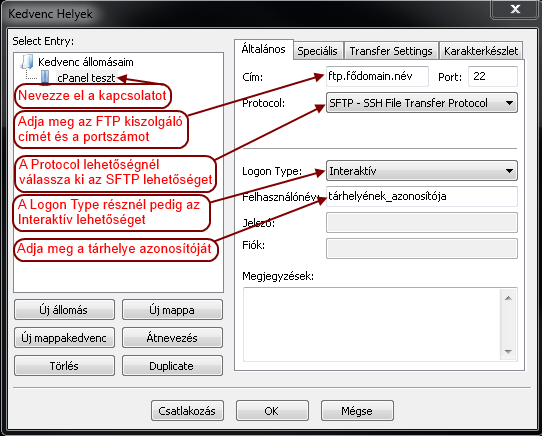
Enter connection data
CONNECTING
As a last step, click Connect.
Using FTP with WinSCP
The data given in the picture is an illustration! You can find your actual settings in the administration interface!
WinSCP is a free, open source FTP/SFTP/SCP client, with support for multiple encryption schemes.
- After starting the application, click „Session”
- Choose FTP as your file protocol
Enter your login data:
- Host name: hostingID.loginssl.com
- User name: the FTP user name created or the hostingID
- Password: enter your password
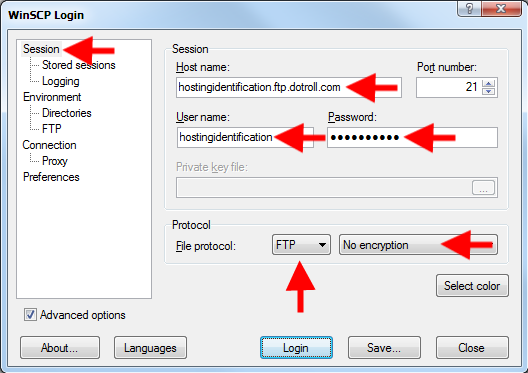
WinSCP opening screen
Enable passive mode in the Connection menu, if you experience problems.
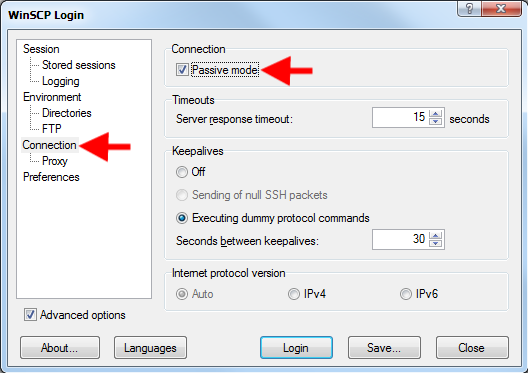
Enable passive mode
Now click the Save… button. In appearing window, you may enter a name to identify the connection.
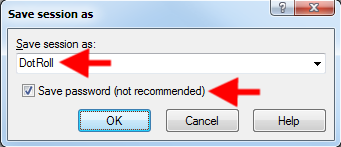
Save session as
Now click Stored sessions and login with your stored session.
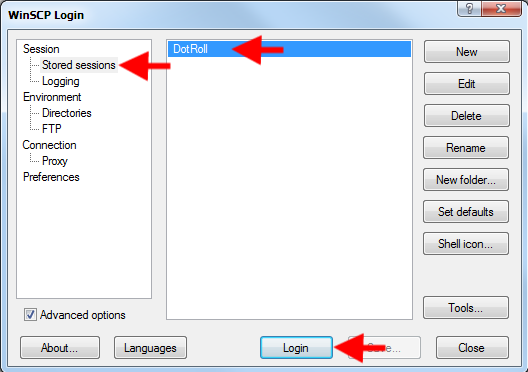
Load stored sessions, and connect
FURTHER READING
Using FTP with Total Commander
The data given in the picture is an illustration! You can find your actual settings in the administration interface!
Total Commander is an easy to use file manager with FTP support.
Launch Total Commandert, then click the FTP entry in the Network menu or simply click the FTP button.
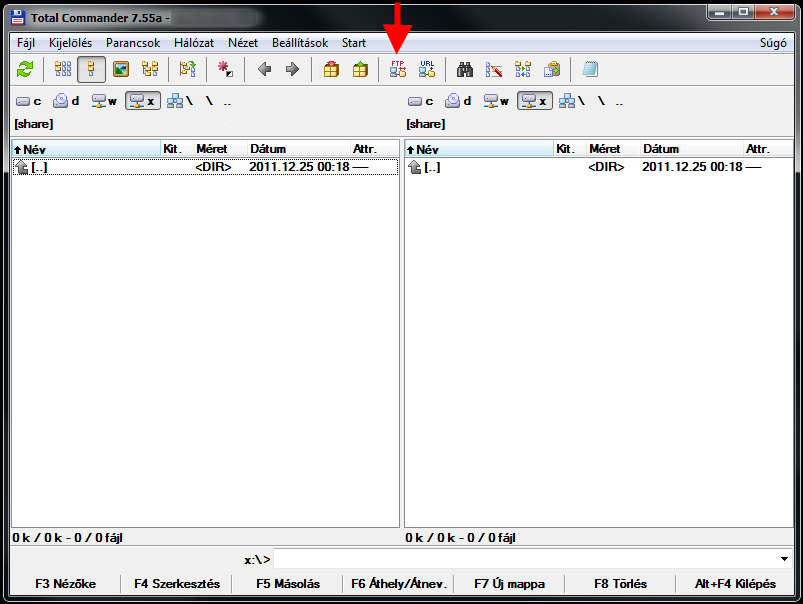
Total Commander main window
Now click New connection… and enter your details
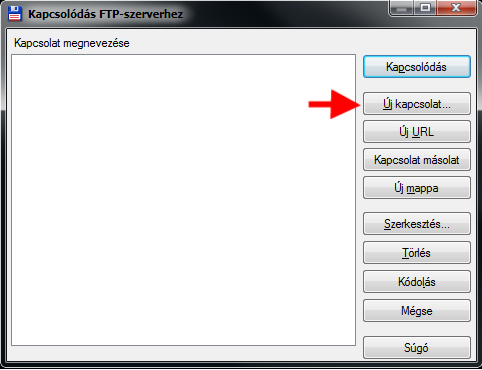
Connetc to FTP servers
Please provide the following details:
- Connection name: szabadon választott
- Server name: hostingID.loginssl.com
- User name: the created FTP user name or the hostingID
- Password: your password
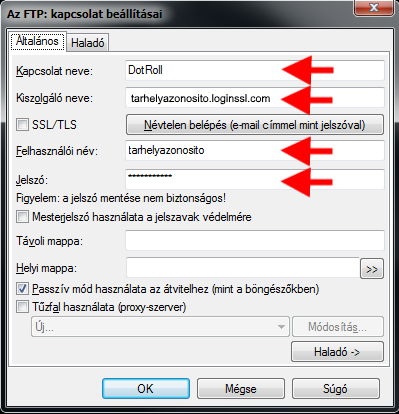
The FTP connection settings
Enable passive mode if you experience connection problems.
FURTHER READING
How to setup FileZilla FTP client
The data given in the picture is an illustration! You can find your actual settings in the administration interface!
Full-featured FTP program, free. It supports firewall, custom commands, queuing multiple files, etc.
After starting the program, click on “File -> Favorite Places ..”. Here we can add a new FTP connection.
Click the “New Station” button. You can enter the name of the station.
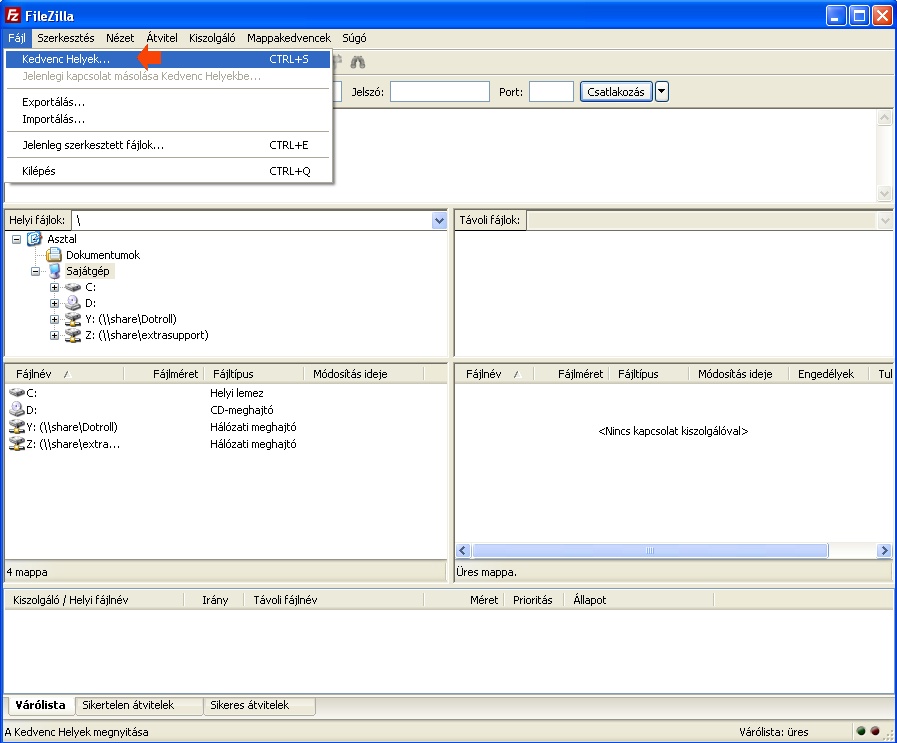
FileZilla Opening screen
Then enter the information required to connect:
- Address: cpanelusername.loginssl.com
- Port: 21
- Server Type: FTP – File Transfer Protocol
- Logon Type: Normal
- Username: Your cPanel login name
- Password: Your cPanel password
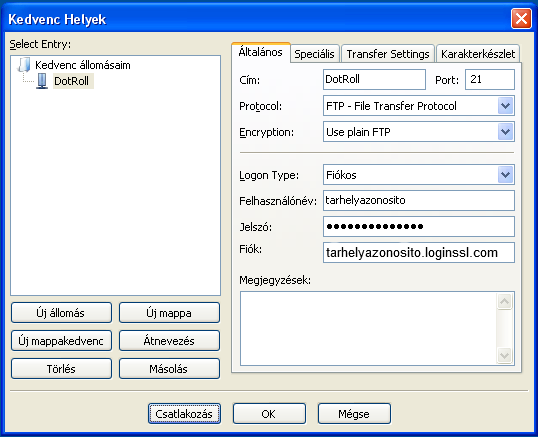
FileZilla Connection settings
You may also want to select “Passive” under “Transmission Mode” on the “Transmission Settings” tab.
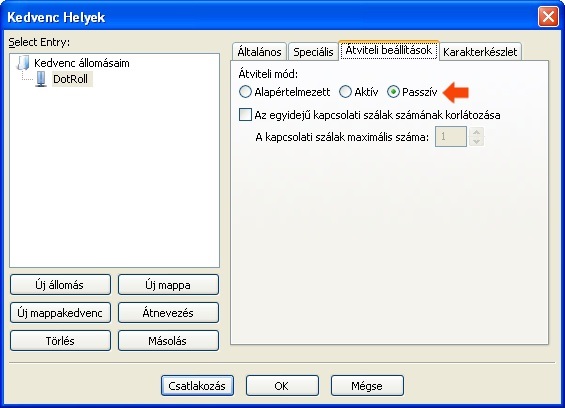
FileZilla Passive mode
You can then click the Connect button.
FURTHER READINGS
DotRoll free hosting
If you buy a domain from DotRoll Kft, you can use a 50 MB static storage space free of charge. This means that the dynamic-based system (forum, content manager, blog) cannot be operated from this repository, however, we can store our pages created in raw HTML, with editors if necessary.
For technical reasons, free hosting can only be used if you use DotRoll Ltd. name servers.
SET THE FTP PASSWORD
- Log in to the page, then click Domains in the top menu bar
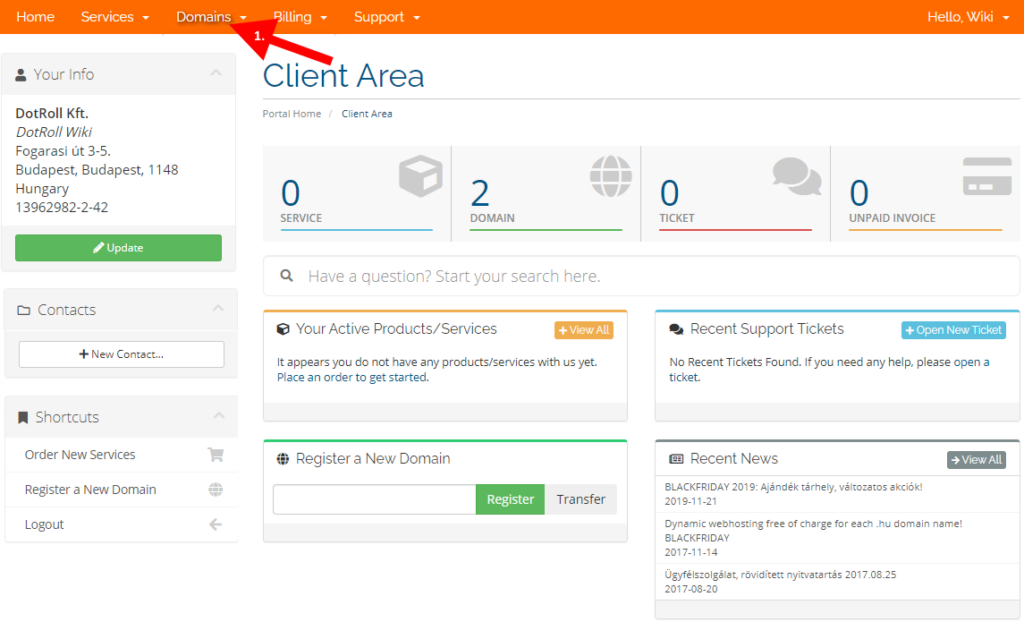
- Select the My Domains submenu from the drop-down menu
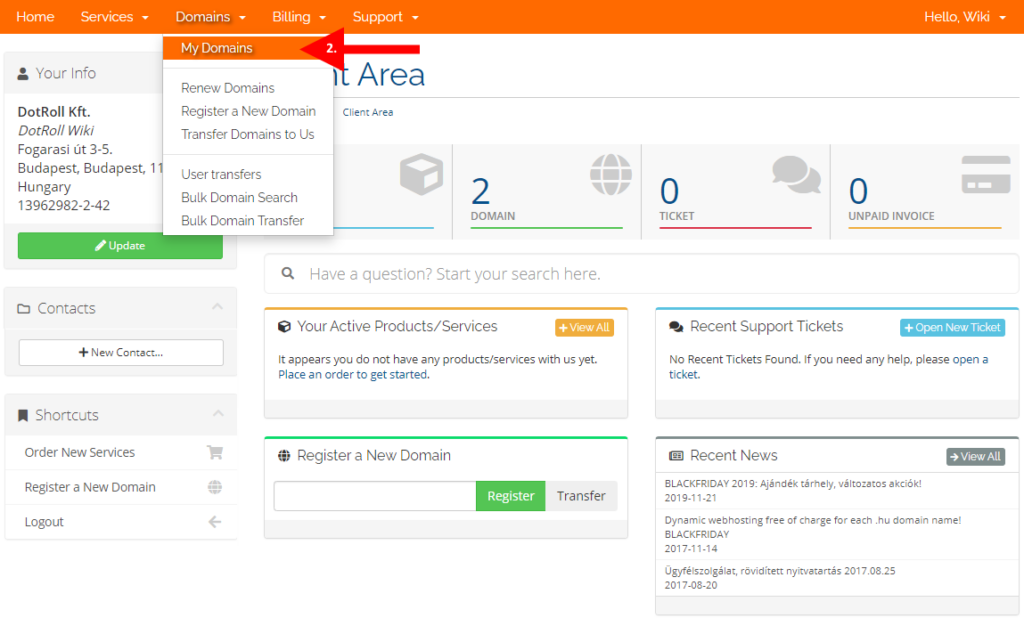
- Then click the wrench icon at the end of the line.
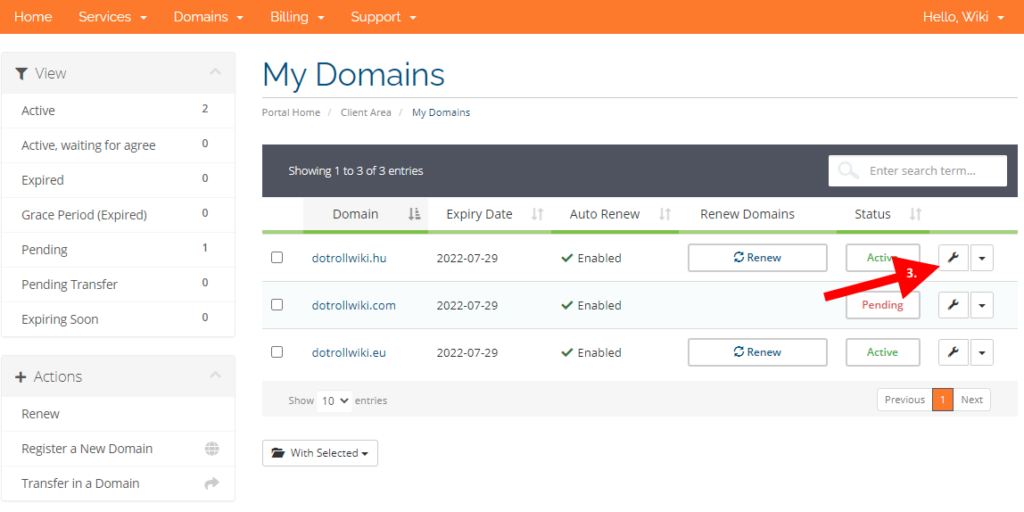
Wrench icon
- In the Manage box at the top left of the page, click Free Hosting option
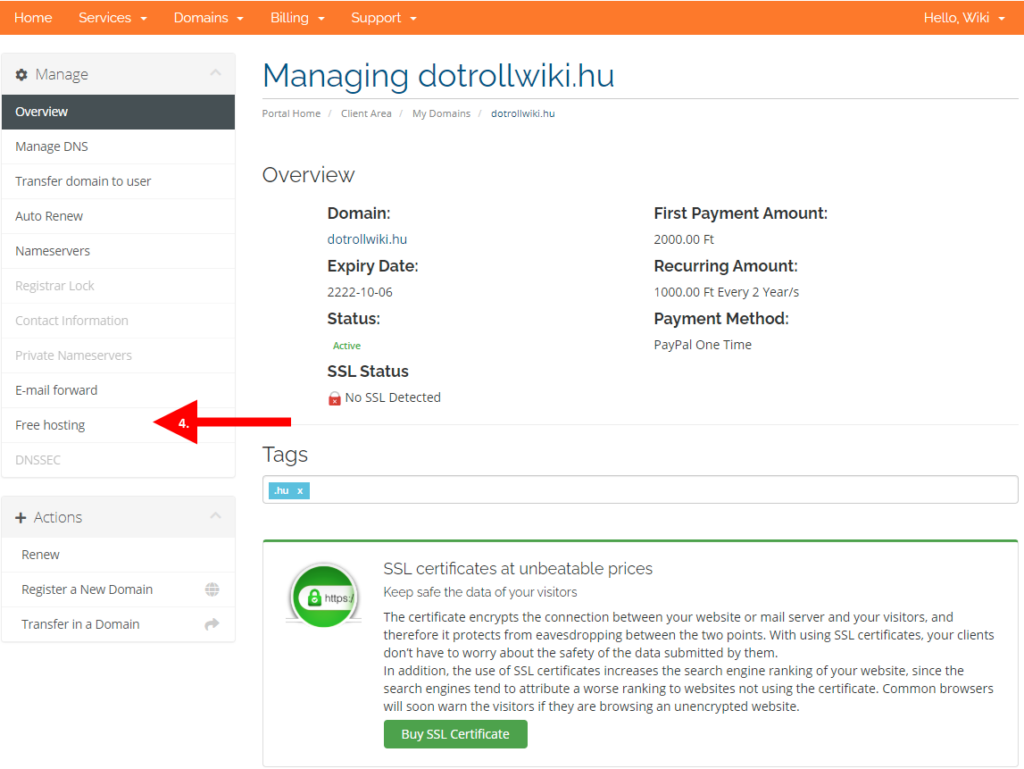
Select Free hosting option
- On the page that appears, enter:
- the password for the FTP user
- repeat the password
- Select the checkbox next to I have read and agree to the Terms of Service.
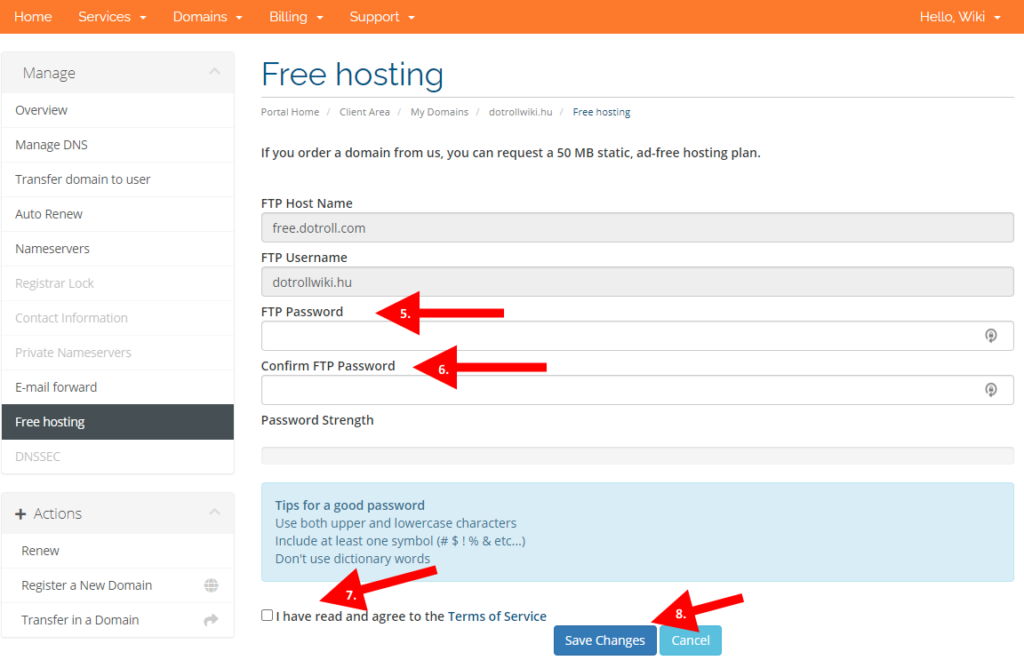
Type password
- Finally, click the save button.
CONNECT TO THE FTP SERVER
After saving, you can connect to the FTP server after specifying the following settings:
FTP server address: free.dotroll.com
FTP port: 21
FTP user name: enter the domain name for which you have previously set up Free Hosting.
FTP password: the previously set password.
To avoid possible connection problems, we recommend that you use the FTP client program to connect to the server in passive mode.
SUPPORTED FTP CLIENT PROGRAMS:
- Total Commander
- FileZilla
- FireFTP
DISPLAYING UPLOADED CONTENT IN THE BROWSER
In order for the content uploaded to the hosting to appear in the browser, you must change the current A and / or WWW A record in the DNS settings for that domain name.
- To change your DNS settings, click Manage DNS in the Manage box on the domain name data sheet.
- On the page that appears, find the plain Park record for the domain name and click Delete, in case you want your domain name to display the same content with and without the www prefix, then click the Delete button for the Park record starting with *.
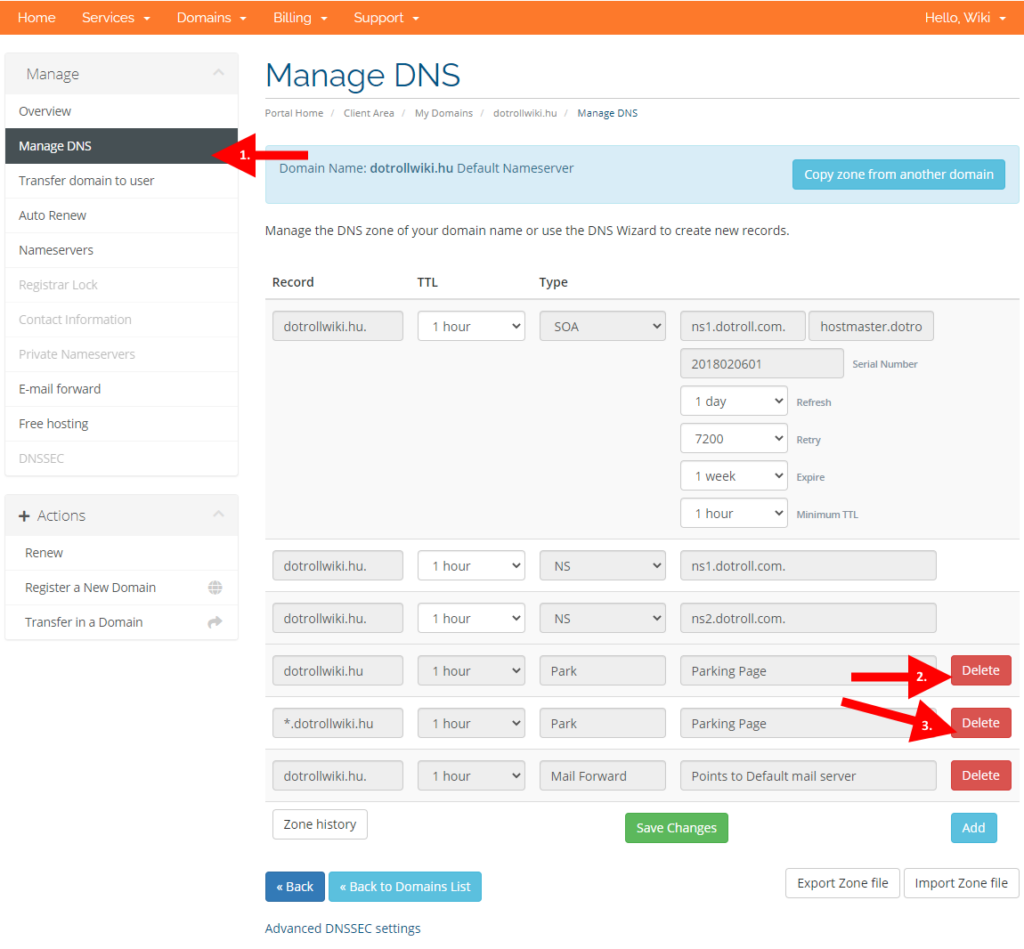
Select Manage DNS option
- Then double-click the Add button in the lower right corner of the page
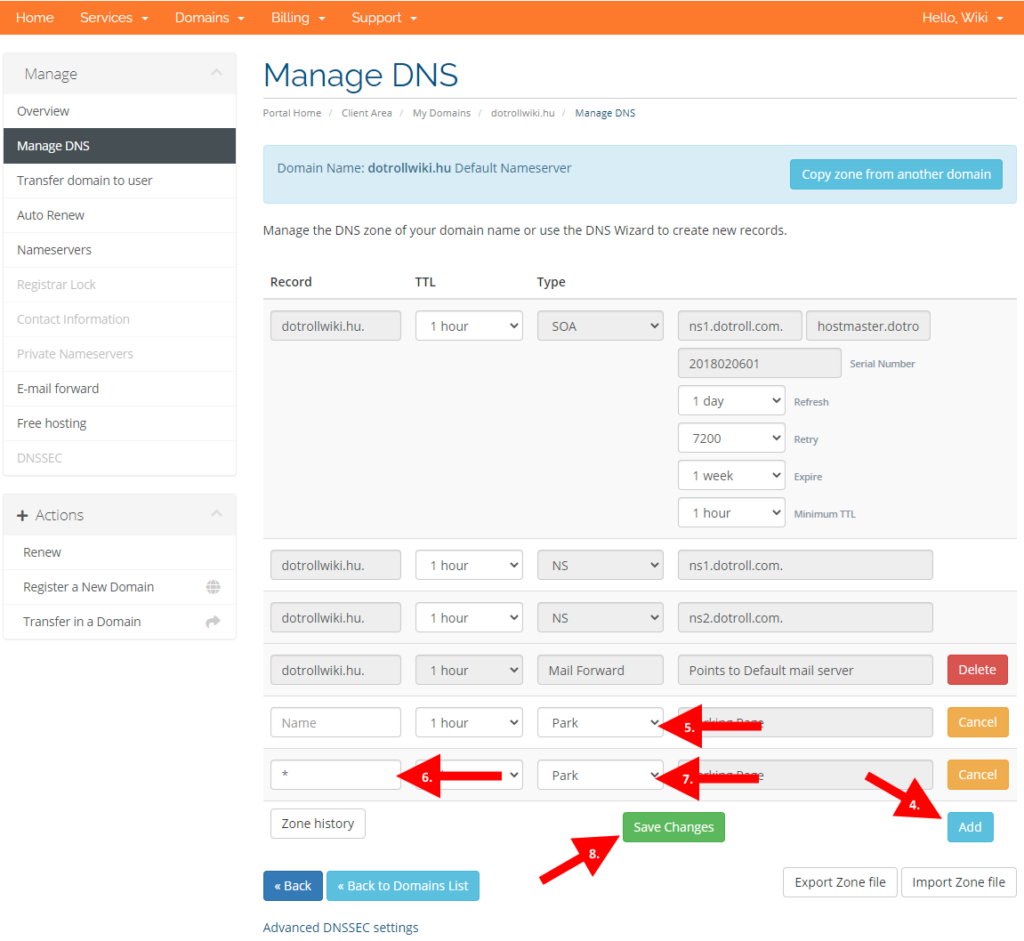
Edit the DNS zone
- Select Freeweb from the drop-down list in the third column.
- In the first field on the bottom row, enter the * prefix, and in the third column, select Freeweb.
- Finally, use the Save Changes button to save the configuration.
Because the previously specified settings in the zone file for the domain name have changed, it must be updated. This refresh time usually takes 1-4 hours so during this period, calling the domain name in your browser may not display the uploaded content.
Illegal PORT command
If you are behind a router (NAT) or firewall while using FTP, you must enable passive mode in your FTP client.
FTPS
If you are behind a router (NAT) or firewall while using FTP, you must enable passive mode in your FTP client.
FTP
FTP (File Transfer Protocol) is a protocol for copying files to remote sites. Due to the fact, that it was born in the early years of the internet, no encryption was implemented. To remedy the situation, FTPS was invented.
FTP has two modes of operation: active and passive. Active means, that the server connects back to the client to transfer data. This is only possible, if the client is not behind a firewall / NAT router. Most home / company sites are protected by such devices, so use of passive mode is recommended.
Below are some third-party clients, without the need for completeness
WINDOWS
- Total Commander
- WinSCP
- Filezilla
- FireFTP
- Cyberduck
- CrossFTP
- FlashFXP
- CuteFTP
MAC OS X
- Yummy
- Filezilla
- FireFTP
- Cyberduck
- CrossFTP
- Fetch
- Transmit
- Captain FTP
UNIX/LINUX
- Konqueror KDE
- FTP Natutilus (GMONE)
- Filezilla
- CrossFTP
- gFTP
- FtpCube
- FireFTP
- Midnight Commander
You can find a comparison of FTP clients here.
SEE MORE
- FTPS
- Illegal PORT command
Creating and editing a file via FTP
The easiest way is to use FTP client to create and modify files on your storage. This method is much simpler than creating and editing command line files. Any FTP client program can be used, however, in this document, we will present the filezilla client as duplicate and modify the files. The program can be downloaded from the following link:
Of course, you can create a file using cPanel’s built-in file manager or SSH, and you can access the related descriptions through the following links:
The following description is just an example of how to create or modify a file using an FTP client. Following the description, make sure you create the file at the right place. If you modify it, edit the file you want.
CREATE A FILE
You can create a file using the steps below:
- To connect to the server, see the description of the use of FTP clients.
- Make sure that clines is turned on to show hidden files
- After you have successfully logged in, make sure you are in the directory where you want to create the file. You can see it at the right of the file manager in the “Remote Directory” section. In the example, the remote directory is /home/example_user/exampledomain.com
- Right-click and select Create a new file
- In the popup window that appears, enter the file name. In this example, the file is named .htaccess. Then click OK.
- Then the empty file created on the server becomes visible.
EDIT A FILE
Follow the steps below to change an existing file.
- To connect to the server, see the description of the use of FTP clients.
- Make sure that clines is turned on to show hidden files
- After you have successfully logged in, make sure you are in the directory where you want to create the file. You can see it at the right of the file manager in the “Remote Directory” section. In the example, the remote directory is /home/example_user/exampledomain.com
- Right-click on that file and select Edit
- In the popup window that appears, you can select the text editor. You can specify an already installed text editor, but you can also use the default for Notepad for Windows.
- After Notepad has loaded the file, make the necessary changes, then save the file with File / Save and close the Notepad application.
- After a few seconds, a warning will alert you to a change in the file and offer the upload. Select Yes here.